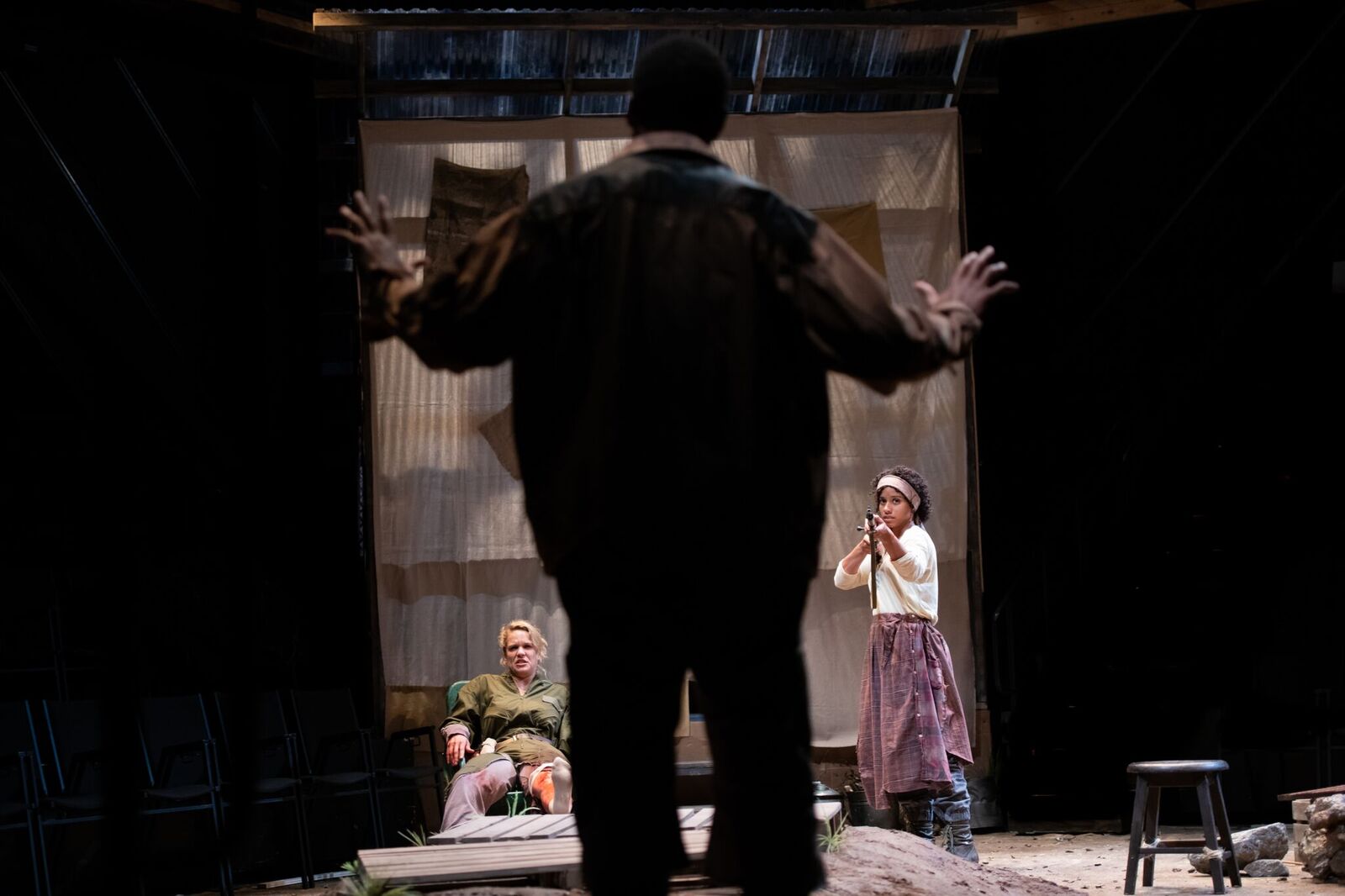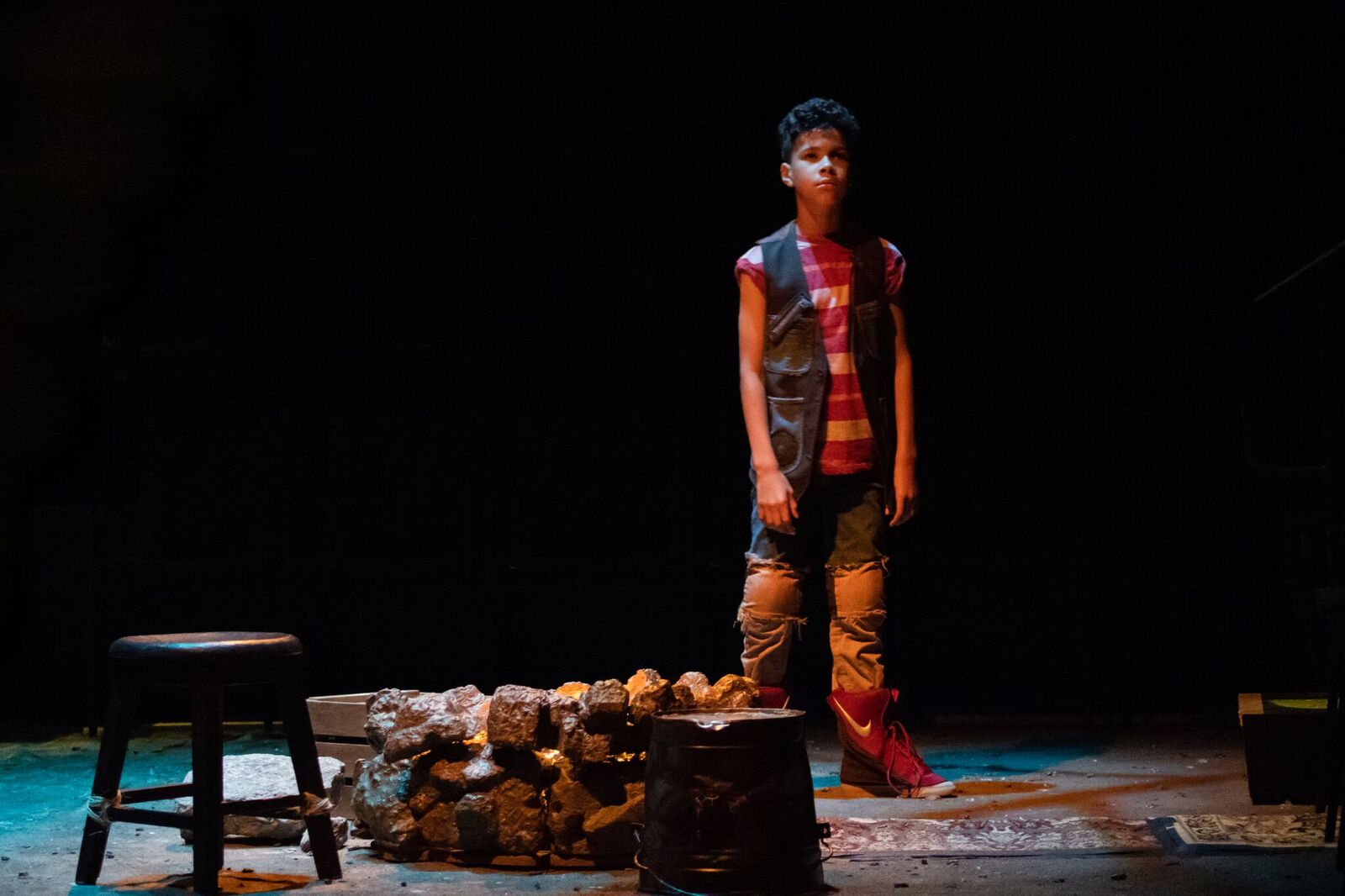Dystopias can be off-putting places, for those in search of more traditional fictional locales. Why would you want to begin your story in a wasteland, where everything we associate with civilization has already been wiped out? Where decency is weakness, and (so the stereotype goes) the only thing that matters is blowing stuff up, blowing people away, and being ruled by steroid-infested males of the species?

C.A. Johnson, in her latest play Thirst, has a vivid, eloquent response to that question. We need dystopian settings because sometimes the only way you can discover heroism in unexpected places, among seemingly vulnerable, marginalized people, is to start from scratch. Because we know in our hearts that the greatest heroism resides in those among us who don’t strap on a gun, looking for a fight; it resides in those who quietly, fiercely, stand up for us while retaining all of their humanity in the face of all that inhumanity can throw at us.
In Thirst, we confront a primal, fundamental human need: water. Johnson puts us in a place where the only thing keeping what’s left of society together is the discovery of a well, which provides water – in discreet, rationed quantities – to the survivors of a civil war. The victors are a band of African-American rebels led by Terrance (the riveting Ryan Nathanial George), whose bitterness from past battles remains.
True to form, this revolution, like so many before it, has the potential to eat its own, and in Terrance’s confrontations with his brother Bankhead (played with empathy and humanity by William Oliver Watkins) and his deputy Coolie (the explosive Justin Withers) we see how the anger which prompted the war has yet to dissipate. The struggle now becomes internal, among the revolutionaries themselves and within the wounded psyches of those who fought. Even the discovery of a stash of Glenlivet, which they sip with alacrity, doesn’t bring them closer to inner peace.
You’re looking for heroes? You sure won’t find them at this HQ. But Johnson also leavens the dark with humor, sometimes folksy, sometimes dark, and she has a knack for knowing when to pull back and give the audience a chance to breathe, chuckle, and – even more importantly – think.
Johnson wants you to look critically at these men’s penchant for violence, but she does so in order to turn your focus to a small family of survivors who, although unrelated by blood, are united by their commitment to each other. The play actually begins with a young orphan, Kalil (Jalon Christian, in his theatrical debut), who has found new mothers in a loving couple, Samira and Greta. Together, these two women make a home for Kalil, with Samira tending to the home front while Greta dons her tool belt and works odd jobs to make ends meet.

This trio becomes the focus of our hopes for the duration of Thirst, and although the family faces tragedy, it is Kalil’s youth that gives him the ability to survive with his soul intact; understanding violence through a child’s eyes, the ability to sift through the messiness of life during wartime and get to its essence, make sense of it all, is a gift that many children have. It’s not that they’re untouched, but they can grasp why it’s so easy for the grownups around them to make such a mess of things. Jalon Christian’s quiet insightfulness, his calm in the eye of the storm, anchors the play in many important ways.
As Greta, the provider for this small family, Jessica Savage has the grit and determination to survive anything. As the lookout, she is also aware of forces ranged around and against them; her tenderness with Kalil and Samira are matched by her steely resolve. That’s heroism enough, but Johnson asks us to focus also on Samira, who nurtures Kalil and keeps the house in order while Greta is away.
It turns out that Samira was once Terrance’s wife, and her decision to leave him, to bond with (and live with) Greta has become a serious issue. There are racial questions here – Terrance and Samira being black, and Greta being white – but Samira knows that deep down, Terrance’s issues go beyond questions of complexion or sexual orientation. He needs her, and the question is whether Terrance can come to grips with the fact that he is a changed man, not the one she married, and that she needs to move on.
Terrance and Samira’s final confrontation, with the questions of survival, revenge, commitment, and remorse swirling over their heads and pounding away at their souls, is one of the most dynamic and necessary scenes you’re liable to see at the Contemporary American Theatre Festival this summer. And Monet fully embodies the grace, love, and fierce pride of Samira, memorably so. Her Samira is every inch a match to her rebel-leader ex-husband, and he knows it.
Scenic Designer Jesse Dreikosen evokes overhanging tropical trees and a rough dirt mound, topped with pallets, to create the environment of a post-war settlement. Elisheba Ittoop’s discreet sound design gives us a solid sense of the remote locale, while a sheer fabric designates Samira and Greta’s home, and a small fire pit becomes the focus of attention frequently – keeping the flames burning an essential task since mankind’s beginning. But for all the bleakness of the surroundings, it is a weathered old shoebox, cherished by Terrance and only opened at the play’s climax, that reminds us what was ultimately at stake.
If you come to see Thirst, this being a play about desperate times, be prepared for some well-staged combat segments, choreographed by Aaron Anderson. They are designed to be shocking and in-your-face (or, if you happen to sit in the front row, in-your-lap), and of course, if there’s a gun onstage, some fool is bound to use it. There will be darkness, but there is also light, and an important lesson to be learned about the wages of machismo and the need for familial loyalty over revolutionary zeal.
Running Time: 100 minutes, with no intermission.
Thirst runs through July 29, 2018, at the Marinoff Theater at Shepherd University – 62 W Campus Drive, in Shepherdstown, West Virginia. For tickets call 800-999-CATF (2283) or 304-876-3473, or purchase them online.




